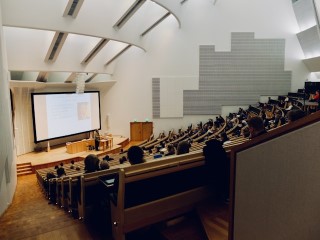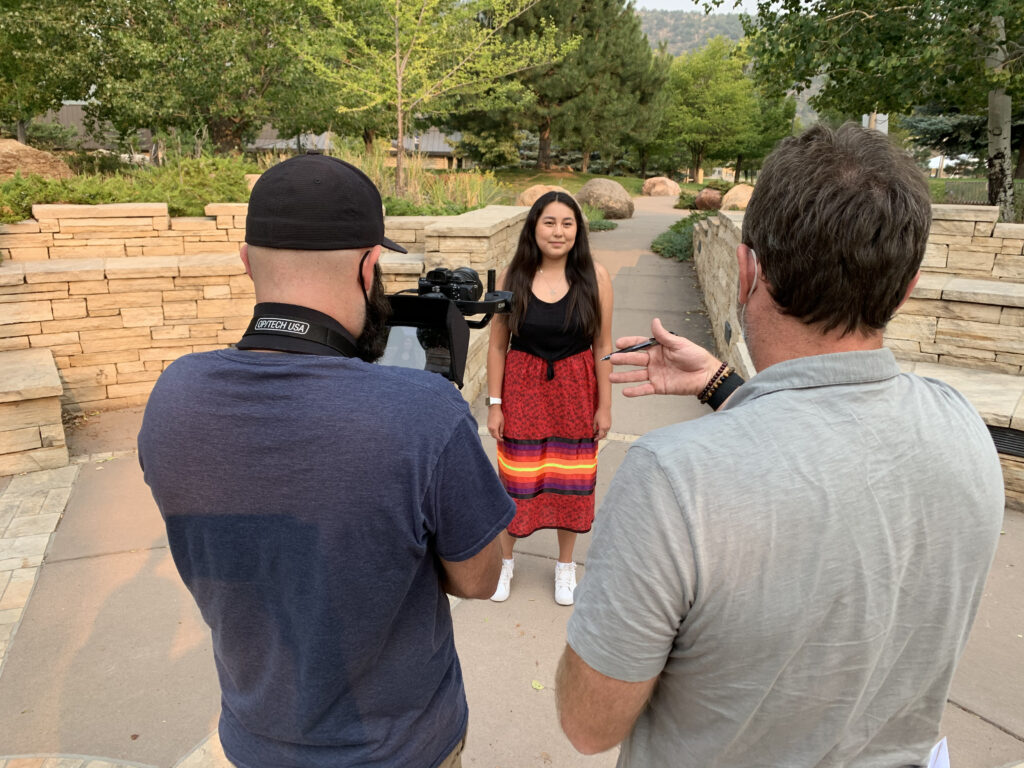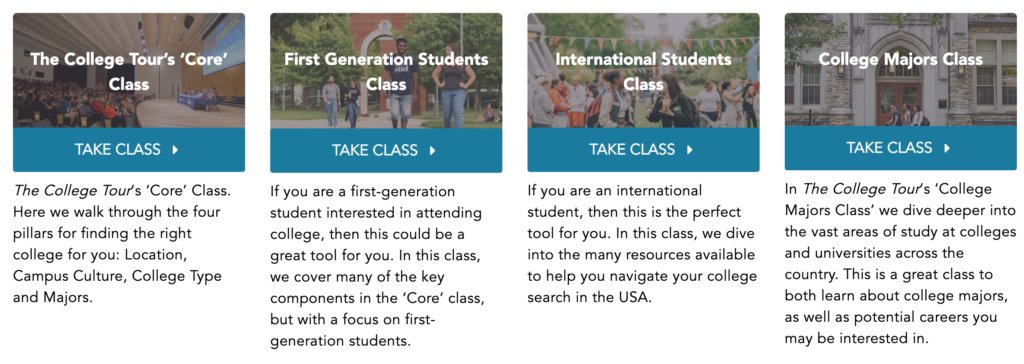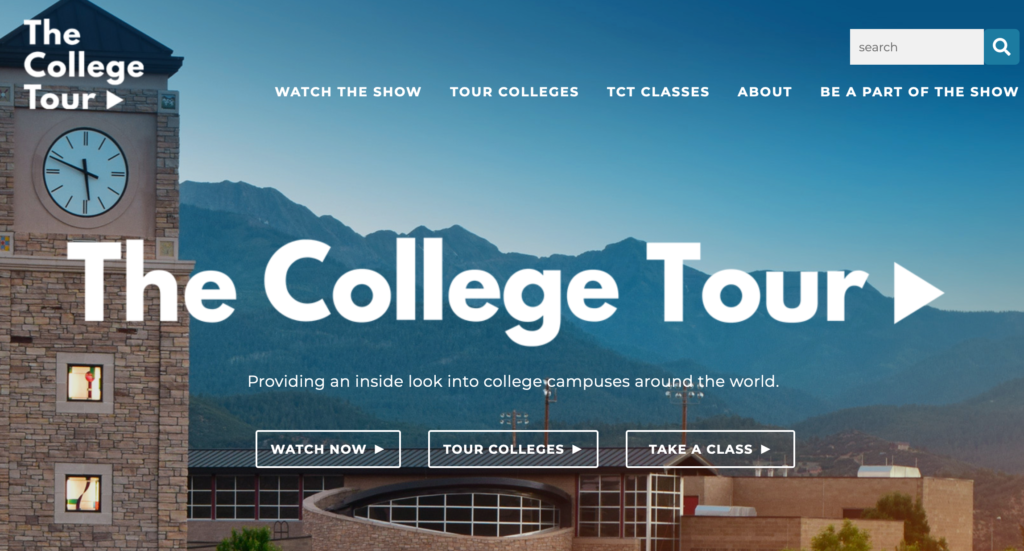
Taking college campus tours is an exciting step in the journey toward higher education. Whether you’re exploring potential campuses near or far, making the most out of your visit requires careful planning and a strategic approach. To help individuals navigate this important milestone, we’ve compiled a list of expert tips to ensure you get the most out of your college search.
1. Do Your Research Beforehand
Before setting foot on campus, take the time to research each college you plan to visit. Familiarize yourself with the campus layout, notable facilities, academic programs, and extracurricular opportunities. Check out The College Tour to see if there is an episode on the college and make sure you watch to order to learn about the culture of the school through the voices of current students. Create a list of questions you want to ask during the tour, such as details about specific majors, housing options, or campus amenities. This will help you make the most of your time on campus and ensure you get the information you need to make an informed decision.
2. Schedule a Guided Tour
While it may be tempting to explore the campus on your own, scheduling a guided tour with a knowledgeable student ambassador or admissions representative is highly recommended. Guided tours typically cover key campus landmarks, academic buildings, residence halls, and other important facilities. Take advantage of this opportunity to ask questions, interact with current students, and gain valuable insights into campus life.
3. Attend Information Sessions and Admissions Events
In addition to the campus tour, many colleges offer specialized information sessions and admissions events for prospective students and their families. These sessions provide in-depth overviews of the college’s academic programs, admissions process, financial aid options, and student support services. Attend as many of these events as possible in order to gain a comprehensive understanding of everything each college has to offer and how it aligns with your academic and personal goals.
4. Explore Beyond the Tour Route
While the guided tour will cover the main highlights of the campus, don’t be afraid to venture off the beaten path and explore areas that may not be included on the tour route. Take a stroll through the student center, library, dining halls, and recreational facilities to get a sense of the campus atmosphere and student life. Pay attention to details such as cleanliness, safety measures, and overall campus vibe.

5. Connect with Current Students
One of the best ways to get a feel for campus life is to connect with current students. Strike up conversations with your tour guide, visit campus cafes or student lounges, and attend campus events or club meetings if possible. Ask students about their experiences, academic interests, and favorite aspects of campus life. Their insights can provide valuable perspectives and help you envision yourself as a member of the college community.
6. Take Notes and Photos
As you explore each campus, take detailed notes and photos to document your impressions and observations. Capture important details such as campus landmarks, academic facilities, dormitory layouts, and recreational spaces. Reviewing your notes and photos later on will help you recall important information and compare your impressions of each college after the tour.
7. Reflect and Evaluate
After completing your college visits, take some time to reflect on your experiences and evaluate each campus based on your preferences and priorities. Consider factors such as academic offerings, campus size, location, campus culture, and financial considerations. Discuss your impressions with family members, teachers, or guidance counselors to gain additional insights and perspectives.
Choosing a college major is a significant decision that can shape one’s academic and professional trajectory. For help with how to choose a major, individuals should consider their interests, strengths, career goals, and values. Exploring various academic disciplines through introductory courses, internships, and informational interviews can provide insight into different fields and help narrow down options. Additionally, researching job prospects, salary potential, and industry trends can inform decision-making and ensure alignment with long-term career aspirations. It’s essential to weigh personal preferences and aptitudes while keeping future career prospects in mind when choosing a major for college.
Conclusion
A college tour is an invaluable opportunity to explore potential campuses and gather essential information to inform your college decision-making process. By following these insider tips and tricks, you can make the most out of your campus visits and gain valuable insights into each college’s academic programs, campus culture, and student life. Remember to approach each visit with an open mind, ask questions, and trust your instincts as you navigate this exciting chapter in your educational journey.

In today’s increasingly competitive job market, a college degree has become more of a necessity now than ever. However, the rising cost of tuition at four-year institutions has left many students and their families grappling with the daunting prospect of student debt. Fortunately, community colleges offer a practical and affordable solution for those seeking to pursue higher education without breaking the bank.
Affordability Without Compromise
One of the most significant advantages of community colleges is their affordability. Compared to traditional four-year universities, community colleges typically offer lower tuition rates, making higher education accessible to a broader range of students, regardless of their financial circumstances. In fact, the cost of attending a community college can be a mere fraction of the cost of attending a four-year institution, allowing students to save thousands of dollars on their education.
Embarking on a college search can be both exhilarating and daunting, as students navigate the myriad of potential options in order to find an institution that aligns with their academic aspirations and personal preferences.
Flexible Learning Options
Community colleges offer a plethora of benefits beyond affordability. Among these advantages is the flexibility in course offerings and scheduling, facilitating a harmonious balance between academic commitments and other responsibilities such as work or family obligations. Whether you’re a recent high school graduate eager to kickstart your college journey or a working professional seeking to expand your skill set, community colleges provide a wide range of programs and courses tailored to accommodate learners from diverse backgrounds and interests. When considering how to choose a major, it’s crucial to reflect on your interests, strengths, and long-term career goals.
Transfer Opportunities
Another compelling aspect of community colleges is their seamless transfer pathways to four-year universities. Many community colleges have articulation agreements in place with four-year institutions, allowing students to transfer their credits and seamlessly transition into bachelor’s degree programs upon completion of their associate degree. This pathway not only enables students to save money on tuition, but also provides them with the opportunity to explore their academic interests before committing to a specific major or career path.

Personalized Support Services
Community colleges are known for their personalized support services, which include academic advising, tutoring, and career counseling to help students succeed both academically and professionally. Whether you need assistance with course selection, study skills, or job placement, community college staff are dedicated to providing the guidance and resources you need to thrive in your educational journey and beyond.
Building Stronger Communities
Beyond affordability and accessibility, community colleges play a vital role in building stronger communities by providing educational opportunities to individuals who may not have otherwise had access to higher education. By offering relevant workforce development programs and partnering with local businesses and industries, community colleges contribute to economic growth and prosperity in their communities, fostering upward mobility for a skilled and competitive workforce.
Conclusion
Campus tours offer prospective students a firsthand glimpse into the vibrant academic, social, and cultural atmosphere of each university, guiding them towards informed decisions about their higher education journey. Moreover, community colleges offer a cost-effective and practical solution for individuals seeking to pursue higher education without incurring significant debt. With their affordable tuition, flexible learning options, seamless transfer pathways, and personalized support services, community colleges empower students to achieve their academic and career goals while building stronger and more vibrant communities. Whether you’re looking to earn an associate degree, transfer to a four-year university, or acquire new skills for the workforce, community colleges provide the resources and opportunities you need to succeed. Embrace the value of community college education and embark on a transformative journey toward a brighter future. Find episodes covering dozens of different community colleges here.

In the competitive realm of college admissions, embarking on a thoughtful college search and presenting a standout application is more crucial now than ever. With thousands of students vying for a limited number of spots, the distinction between an accepted and a rejected application can hinge on even the smallest details. Crafting an application that not only highlights your achievements, but also showcases your unique character and potential is an art form. Below, we explore the dos and don’ts of assembling a college application that will make a lasting impression on admissions committees during your college search journey.
The Dos of College Applications
- Do Focus on Your Personal Narrative
Your application should be utilized as a storytelling platform. It’s your opportunity to narrate your journey, challenges, achievements, and aspirations. A compelling personal statement that connects your past experiences with your future goals can make a significant difference. Ensure that your narrative is authentic and reflects your individuality. Admissions officers are looking for genuine personalities, not just academic machines. - Do Highlight Your Extracurricular Activities
Colleges are interested in well-rounded individuals who will contribute to their campus in diverse ways. Your extracurricular activities provide a window into your passions, commitments, and potential for leadership. Be sure to not only list these activities, but also elaborate on your roles, the skills you developed, and how these experiences have shaped you. - Do Showcase Your Academic Curiosity
While grades and test scores are critical, demonstrating your love for learning extends beyond these metrics. If you’ve pursued any independent research, online courses, or reading beyond your school’s curriculum, make sure to highlight these endeavors. This shows admissions officers that you are intellectually curious and engaged in learning for the sake of knowledge, not just grades. - Do Seek Quality Recommendations
Letters of recommendation are your application’s endorsements, providing insight into your character and abilities from those who have worked closely with you. Choose recommenders who know you well and can speak to your strengths, achievements, and growth. Provide them with your resume or a summary of your accomplishments to help them write a detailed and personalized letter. - Do Pay Attention to Detail
Meticulously review your application for any errors or inconsistencies. A well-polished application reflects your professionalism and dedication. Adhere to word limits, follow instructions carefully, and ensure that every part of your application is complete.
The Don’ts of College Applications
- Don’t Procrastinate
Starting your application at the last minute is a recipe for stress and mistakes. Begin early to give yourself ample time to reflect on your experiences, draft your essays, and revise them. Procrastination can lead to a rushed application that fails to represent your best self. - Don’t Undersell Yourself
Modesty has its place, but your college application is not it. This is your chance to shine and to assert confidently what makes you an exceptional candidate. While boasting without substance is unappealing, clearly articulating your achievements and the effort behind them is crucial. - Don’t Overlook the Essay Prompts
Each essay prompt is an opportunity to reveal a different facet of your personality or life story. Addressing the prompt directly and thoughtfully is key. Avoid the temptation to recycle a generic essay for multiple applications. Tailor your response to each question, ensuring that it aligns with the school’s values and the prompt’s specific request. - Don’t Ignore the Importance of Fit
Applying to colleges that align with your academic interests, values, and social preferences is vital. Demonstrating your fit with the institution in your application can significantly boost your chances of admission. Research each college thoroughly and mention specific programs, faculty, or campus organizations that excite you in your application. - Don’t Let Setbacks Define You
If your academic record has blemishes or you’ve faced challenges, don’t shy away from addressing them. However, the focus should be on subsequent resilience and growth rather than the setback itself. Colleges appreciate students who can face obstacles, learn from them, and emerge stronger.
Crafting a standout college application is a multifaceted process that requires introspection, meticulousness, and authenticity. By adhering to these dos and don’ts, you can assemble an application that not only showcases your achievements and potential, but also resonates with admissions committees on a personal level. Remember, the goal is not just to present yourself as an ideal candidate, but to demonstrate your fit and potential contribution to the college community as a whole. With thoughtful preparation and a genuine representation of yourself, your application can indeed stand out in the competitive admissions landscape.

As students navigate the complex pathways of academic progress, career exploration, and the college search process, the role of a counselor becomes undeniably crucial. These professionals are not just advisors, but pivotal assets in unlocking a student’s potential and guiding them towards a fulfilling future. Leveraging your counselor’s expertise for college and career planning can make the difference between an uncertain journey and a roadmap to success. This comprehensive guide delves into how students can effectively utilize their counselor’s knowledge and resources during their college search to lay a solid foundation for their academic and professional aspirations.
Understanding the Role of Your Counselor
Counselors wear many hats; they are educators, advisors, and advocates. Their primary objective is to support students in achieving their personal, academic, and career goals. This support might encompass academic advice, emotional support, college preparation, career exploration, and more. Recognizing the breadth of your counselor’s expertise is the first step in leveraging it for your college and career planning.
Establishing a Productive Relationship
- Start Early: Don’t wait until your senior year to meet with your counselor. Begin your conversations as early as high school, or even middle school, to plan your academic trajectory and explore your interests.
- Be Open and Honest: Share your aspirations, fears, strengths, and weaknesses. The more your counselor knows about you, the better they can tailor their guidance to suit your needs.
- Regular Check-ins: Schedule regular meetings to update your counselor on your progress, refine your goals, and adjust your plans as needed.
Utilizing Counselor Expertise for College Planning
- Academic Planning: Counselors can help you select courses that align with your college goals, ensuring you meet all prerequisites and maintain a competitive GPA.
- College Search and Application Process: They have vast knowledge about different colleges to help match your interests and qualifications with potential schools. Counselors can guide you through the application process, offering insights into essays, recommendations, and deadlines.
- Financial Aid and Scholarships: Understanding the complexities of financial aid, scholarships, and grants can be daunting. Your counselor can provide valuable resources and advice on navigating these processes, helping you identify opportunities to finance your education.
Leveraging Counselor Expertise for Career Planning
- Career Assessments and Exploration: Many counselors have access to assessment tools that can help identify your strengths, interests, and potential career paths. These insights can be invaluable in making informed decisions about your future.
- Internship and Job Opportunities: Counselors often have networks and connections with local businesses and organizations that offer internship and job opportunities for students. These experiences are critical for gaining real-world skills and enhancing your resume.
- Resume and Interview Preparation: From crafting a compelling resume to preparing for job interviews, your counselor can provide you with necessary tips, feedback, and practice opportunities to improve your presentation and communication skills.
Maximizing Resources and Opportunities
- Workshops and Seminars: Take advantage of any workshops or seminars your counselor recommends or organizes, covering topics such as college applications, career exploration, study skills, and more.
- Special Programs and Clubs: Counselors can suggest extracurricular activities, clubs, and special programs that align with your interests and goals. These can significantly enhance your college applications and provide valuable experiences.
- Alumni Networks: Some counselors can connect you with alumni who have pursued similar paths, offering insights and mentoring opportunities that can inform your own decisions.
Tips for Effective Collaboration
- Prepare for Meetings: Come with a list of questions or topics you want to discuss. This preparation ensures that you will cover all your bases and make the most of your time.
- Follow Up: After meetings, send a thank-you note, and don’t hesitate to reach out with follow-up questions or updates on your progress.
- Stay Proactive: While counselors provide guidance, remember the ultimate responsibility for your college and career decisions lies with you. Take initiative and be proactive in your planning and research.
Leveraging your counselor’s expertise for college and career planning is more than just attending scheduled meetings; it’s about engaging actively with the process, asking questions, and taking advantage of the wealth of resources and knowledge at your disposal. By establishing a strong, collaborative relationship with your counselor, you set yourself up for a more informed and purposeful journey toward your academic and professional goals. Remember, your counselor is a partner in your success, and together, you can navigate the complexities of college and career planning with confidence and clarity.
The College Tour – A Powerful TV Series and More…
By Lisa Hennessy
As a seasoned TV producer and showrunner for over 25 years, I’ve had the pleasure of telling people’s stories from all around the world. It is a responsibility that I do not take lightly.
Over the last two years, those stories have grown in impact and importance – I’ve had the honor of helping to tell the story of higher education through the very powerful lens of current college students. It was something special right from the start.
Our very first episode of The College Tour TV series was filmed at Fort Lewis College in Durango Colorado in September 2020. The very first student segment we filmed was of a young woman named Ally Gee. Ally, a member of the Navajo nation, talked about diversity on campus.

Two years later, we have now told the story of 82 colleges (across 35 states) and almost 1000 students from all backgrounds. By the end of 2022, we will have filmed 100 colleges!
For us though, it’s not just about telling incredible stories. It is also about listening. Over the course of filming our show, we have heard from many colleges that there is a need to have an option to produce episodes in Spanish language…. so we did. We hear from counselors daily that authentic stories are important to students so we expanded the features of our website so it can be a robust tool for students starting their college research. We also heard from counselors that they would like a class to support their first-generation students… so we created it!
We are excited to share our new and improved website and TCT classes.
The classes were created to inspire students to continue their higher education journey. All are video-based, using segments from The College Tour TV series. The videos in the class are led by students currently attending colleges. The classes are for all ages, from middle school to high school students to adult learners.

In the Core Class, we cover four key pillars for students to start thinking about: College Location, Campus Culture, College Type, and Majors.
When finished with the class, we send the students their answers and a certificate of completion. The students can also add their counselor’s email or parent(s) so the answers can be shared with them as well.
There is NO cost for the classes.
Features on the newly launched TCT website include:
- “Watch Now” to view all episodes of the TCT TV series (6 seasons/70 eps with more dropping weekly). Episodes also stream on Amazon Prime.
- “Tour Now” – a tour page for every 4-year college/university (2,500) and every community college in America (900) to make it easier for students to do their research.
- and “Take a Class” – free video-based classes which use segments from the TV series to help students from all backgrounds with their college search.

We are two years in and we are just getting started! Our goal is to inspire and support young people from all backgrounds with their higher education journey and to one day tell the story of every college in America!
Lisa Hennessy
Co-Creator and Executive Producer of the College Tour.
Connect with me on LinkedIn
